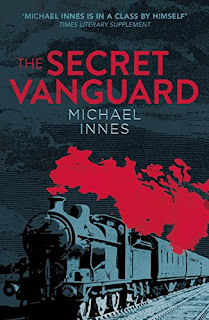Rating: 3/5
Review:
Not one of Innes's best
I have to say that I didn't enjoy The Weight Of The Evidence
as much as some Innes novels. It has his
characteristic dry, satirical wit but I do have my reservations.
This, the eighth in the Appleby series, sees him in
"Nestfield" University (a scarcely disguised Leeds)
investigating the death of an academic who has been killed by a falling
meteorite. It is plainly an act of
murder and Innes's trademark cast of wittily satirised suspect characters and a
plot which depends intricately upon precise times and the exact placement of
buildings and people develops.
Innes's skewering portraits of academics when set in Oxford
seem like poking fun at his peers. Here,
I find a tinge of condescension which I don’t like at all. I know that Innes himself was a lecturer at Leeds
and he even has Appleby inwardly condemn one academic as a snob, but there is
still a slight air of sneering at provincials who don't do things
"properly" in the way that Oxford Colleges do. As a result it seemed far more
self-consciously - perhaps even self-regardingly - highbrow than some of his
other books. This is a personal feeling,
and I'm sure it is not what Innes intended, but it still marred my enjoyment in
quite a few places.
Others may not agree, and certainly if you like Innes's dry,
witty academic banter and rather grumpy take on modern (i.e. 1940s) life there
is much here to enjoy. For me, though,
it's not one I'll be going back to.
(My thanks to Ipso Books for an ARC via NetGalley.)












